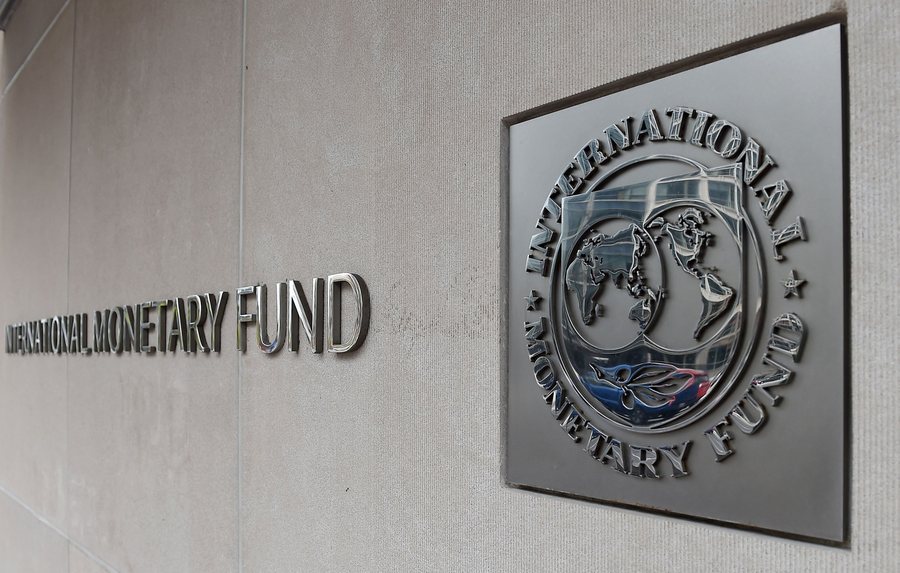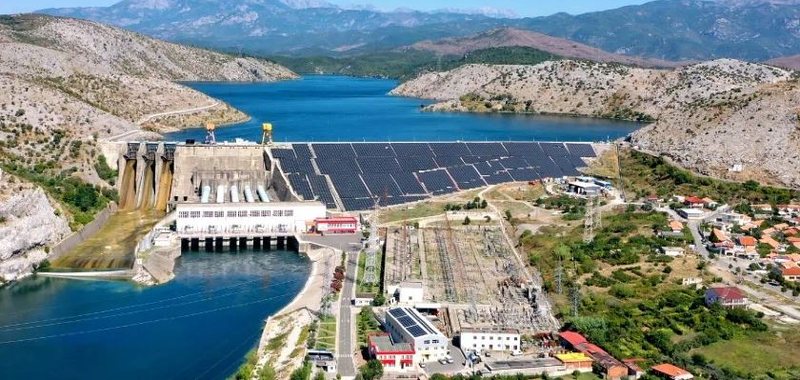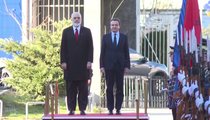FMN nuk sheh recesion në “horizont” - Por, pasiguria e shkaktuar nga tarifat mund të dëmtojë rritjen globale

Përpjekja e presidentit amerikan Donald Trump për tarifa gjithëpërfshirëse po krijon pasiguri të madhe dhe dëmton besimin, por nuk ka gjasa të shkaktojë një recesion afatshkurtër, tha Kreu Menaxhues i Fondit Monetar Ndërkombëtar, Kristalina Georgieva.
Në intervistën e saj të parë që kur Trump mori detyrën, Georgieva nënvizoi sfidat me të cilat përballet një ekonomi globale që ende po shënon rritje dërrmuese pas plagëve të pandemisë COVID, por tha se nuk është e nevojshme të alarmohemi.
FMN ka të ngjarë të ulë paksa perspektivën ekonomike në përditësimin e saj të ardhshëm në rreth tre javë, por "ne nuk shohim recesion në horizont," theksoi Georgieva.
"Ajo që ne shohim në treguesit e frekuencës së lartë është se besimi i konsumatorit, besimi i investitorëve po dobësohen disi dhe ne e dimë se kjo përkthehet në një ndikim në perspektivat e rritjes. Megjithatë, FMN nuk po sheh ende një ndikim dramatik nga tarifat e zbatuara dhe të kërcënuara deri më tani nga Trump që nga kthimi i tij në Shtëpinë e Bardhë, shtoi ajo.
Në janar, FMN e rriti vlerësimin e rritjes ekonomike globale për vitin 2025 në 3.3%, nga 3.2% në vlerësimin e saj të mëparshëm në tetor, me një përmirësim gjysmë pikë përqindje ndaj perspektivës së SHBA në 2.7%.
Ndërsa ndikimi aktual ishte i moderuar, Georgieva paralajmëroi se shumë vende kishin përdorur hapësirën e tyre fiskale dhe monetare gjatë COVID dhe tani kishin nivele të larta borxhi, duke kufizuar aftësinë e tyre për t'iu përgjigjur goditjeve të ardhshme.
Çdo ngadalësim ose ndryshim në procesin e dezinflacionit mund të ngadalësojë rënien e normave të interesit dhe ta bëjë më të vështirë për vendet që të rifinancojnë borxhin e tyre. Zhvillimet tregtare mund të frenojnë "pak" rritjen në SHBA, por perspektiva e saj e përgjithshme mbeti "në rregull", tha Georgieva.
Rritja e planifikuar e shpenzimeve të mbrojtjes në Evropë dhe vendimi i Gjermanisë për të shfuqizuar frenimin e saj të borxhit, të cilin ajo e quajti një "dëmtim të vetëshkaktuar", nënkupton një zgjerim ekonomik më të madh në rajon. Ndërsa Kina duhet të përdorë hapësirën e saj të politikave dhe të fokusohet në rritjen e konsumit të brendshëm.
Ndryshimet tregtare
Që nga kthimi në Shtëpinë e Bardhë në janar, Trump ka vendosur tarifa 20% për të gjitha mallrat nga Kina. Më pas vendosi taksa të larta për importet e çelikut dhe aluminit, si dhe shpalli tarifa 25% për makinat e importuara. Presidenti amerikan ka deklaruar se 2 prilli do të jetë "Dita e Çlirimit", kur ai planifikon të zbulojë tarifat reciproke globale.
Ritmi i paparashikueshëm i njoftimeve dhe zbatimit të taksave ka përkeqësuar qëndrimet e investitorëve, ndërsa indekset kryesore të aksioneve në SHBA kanë rënë me gati 10% që nga mesi i shkurtit, për shkak të shqetësimit se tarifat do të ngadalësojnë rritjen apo edhe do të shkaktojnë një recesion.
Sa më gjatë të vazhdojë pasiguria në lidhje me qasjen e Trump ndaj politikës tarifore, aq më i madh është rreziku për perspektivën, tha Georgieva.
Georgieva tha se tregtia globale vazhdoi zgjerimin, pavarësisht nga një rritje e masave proteksioniste në të gjithë globin, që ka ndryshuar modelet tregtare dhe po sfidon globalizimin. Gjithashtu, tregtia në shërbime po kalon rritjen në tregtinë e mallrave.
Vendet e vogla dhe të mesme po rrisnin bashkëpunimin mes tyre dhe po përqendrohen në reformat strukturore, ndërsa punojnë për të rritur elasticitetin e tyre, shtoi kreu i FMN.

Indianët zotërojnë më shumë prona në Londër sesa vetë anglezët!
Llogaritjet e fundit nga zhvilluesi Barratt London treguan se numri i indianëve që zotërojnë pasuri të paluajtshme në zemër të Mbretërisë së Bashkuar......

Kroacia, 2.7 miliardë euro për mbrojtjen - Kryeministri Plenkoviç: Buxheti është 5-fishuar në raport me vitin 2016
Kryeministri kroat Andrej Plenkoviç ka njoftuar se buxheti i mbrojtjes në vend do të rritet, ndërsa Bashkimi Evropian përballet me presionin për të forcuar......

“Të ardhurat për frymë janë 3-fishuar” - Rama: Në vitin 2030 do të arrijnë në 15 mijë euro
Gjatë një bashkëbisedimi me qytetarët në platformat sociale, Kryeministri Edi Rama u shpreh se që nga viti 2013 e deri më sot të ardhurat për frymë në......

Impianti diellor lundrues në Vaun e Dejës - Projekti me vlerë 13.86 mln euro, KESH: Zbatimi nis brenda vitit 2025
Projekti për ndërtimin e një impianti diellor lundrues për prodhimin e energjisë elektrike në Vaun e Dejës po shkon drejt zbatimit. 4 vite pas krijimit të......

Shqipëria, më tërheqëse për investitorët ekzistues/ Fitimi i riinvestuar zinte rreth 54% të totalit të IHD-ve në vitin 2024
Investimet e huaja direkte gjatë vitit të kaluar në vendin tonë prekën shifrën e 1.58 mld eurove, duke regjistruar vlerën më të lartë në terma vjetorë.......

Strategji e re për blegtorinë - Hapet tenderi 5.8 milionë lekë për planin e biznesit
Bashkia Tiranë ka shpallur hapjen e tenderit për hartimin e studimit të fizibilitetit dhe planit të biznesit për zhvillimin e sektorit të blegtorisë. Fondi......

Kursi i këmbimit/ Forcohen Dollari, Euro dhe Paundi!
Dollari amerikan ka rikuperuar pikë nga dita e djeshme edhe pse pa ndonjë ndryshim të konsiderueshëm duke u blerë këtë mëngjes me 91 lekë dhe duke u shitur......

16-vjetori i anëtarësimit të Shqipërisë në NATO/ Ministri Hasani: "Shqipëria ka NATO-n dhe NATO ka Shqipërinë"
Në 16-vjetorin e anëtarësimit të Shqipërisë në NATO, ka reaguar me një mesazh në rrjete sociale Ministri për Europën dhe Punët e Jashtme, Igli Hasani. “Ne......
















